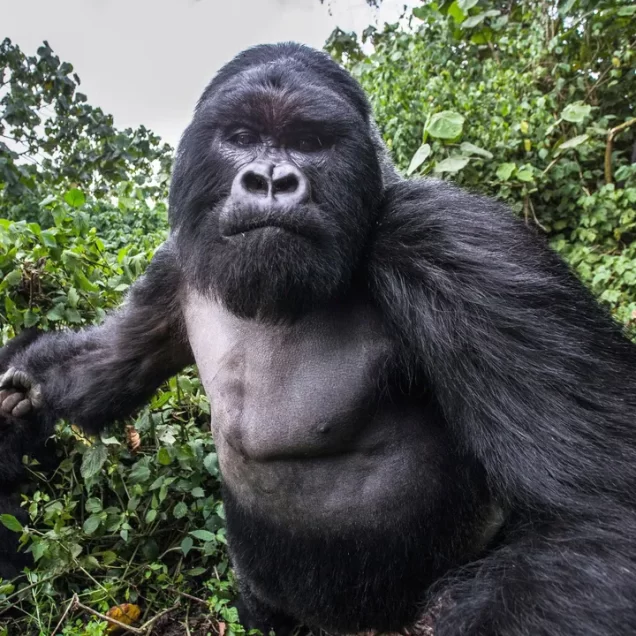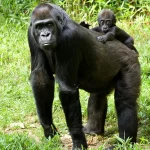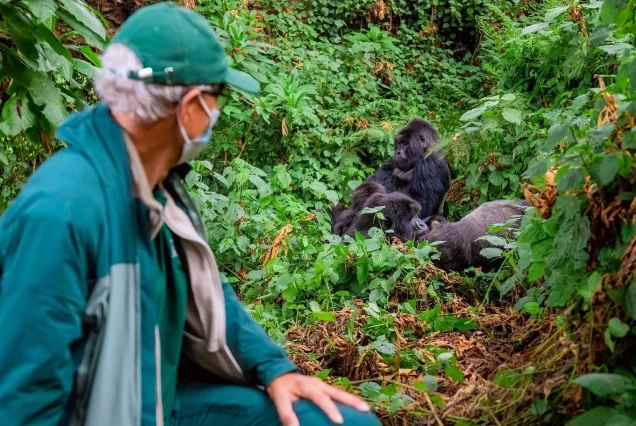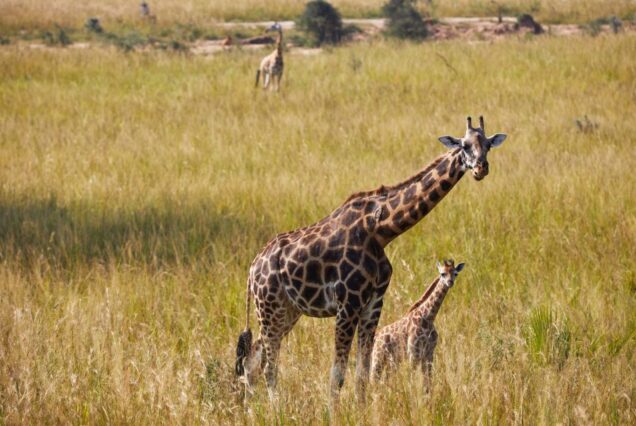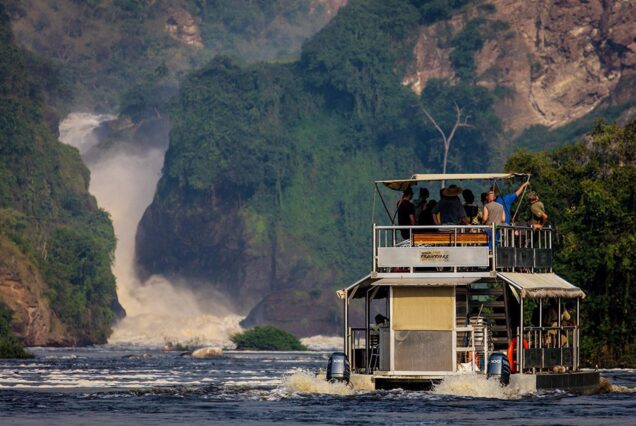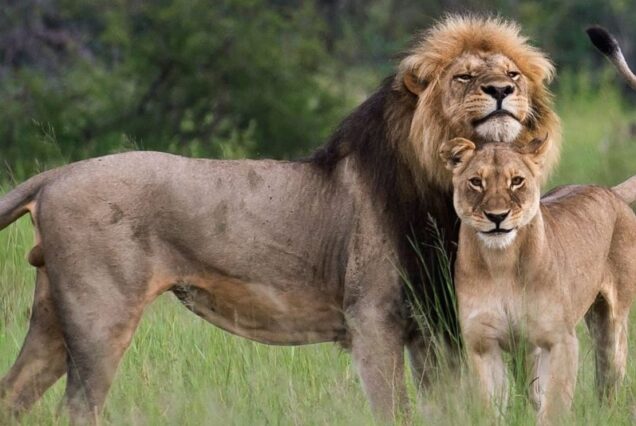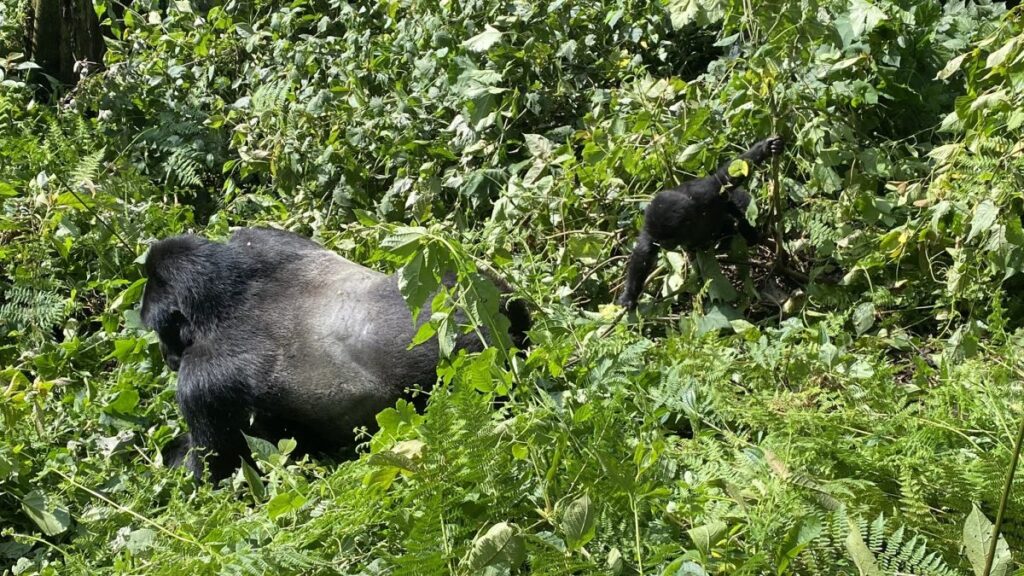

Overview
Uganda is a country of shimmering lakes, lofty mountains and mysterious forests. You will love the country because of its astonishing beauty! It is ideal for a trip of discovery in the most enthralling continent in the world, offering exciting adventures and memorable wildlife encounters. Its naturalness explains it all. It is now explained as “Africa’s Garden of Eden” by many visitors whose physical features moved Sir Winston Churchill to refer the country as the ‘Pearl of the Nile’, an adage which was later changed to “The Pearl of Africa“. Uganda lies between latitudes 4° 12′ N and 1° 29′ S, and longitudes 29° 34′ E and 35° E. It covers a total area of 241,039 square km and stands in the heart of Africa across the Equator .
Map
Info
Uganda is a country of shimmering lakes, lofty mountains and mysterious forests. You will love the country because of its astonishing beauty! It is ideal for a trip of discovery in the most enthralling continent in the world, offering exciting adventures and memorable wildlife encounters. Its naturalness explains it all. It is now explained as “Africa’s Garden of Eden” by many visitors whose physical features moved Sir Winston Churchill to refer the country as the ‘Pearl of the Nile’, an adage which was later changed to “The Pearl of Africa“. Uganda lies between latitudes 4° 12′ N and 1° 29′ S, and longitudes 29° 34′ E and 35° E. It covers a total area of 241,039 square km and stands in the heart of Africa across the Equator .
Neighbours of Uganda and administration
Uganda is a landlocked country. It is bordered by Sudan in the North, Kenya in the East, Tanzania in the South, Rwanda in the Southwest and Democratic Republic of Congo (DRC) in the West. It is divided into administrative units called districts. There are 79 districts at present. Each district has its own headquarters for easy administration and provision of services to the people. At national level, there are line ministries each with a particular role to play in the economy and national development.
National Parks
Uganda is a destination blessed with a diversity of wildlife found in its unique and lovely national parks like Bwindi and Mgahinga for endangered mountain Gorillas, Queen Elizabeth, Murchison, Kibale Mburo, Semiliki, Kidepo, Mt Elgon and Mt Rwenzori suitable for mountain hiking. Its spectacular untouched marvelous natural landscape ranges from big lakes, big rivers, open savannah, big forests, rift valley floor, spectacular waterfalls like Sipi, Bujagali, Murchison , Sezibwa to big mountains.
Ecologically, Uganda is where the East African savannah meets the West African jungle. Where else but in this impossibly lush country can one observe lions prowling the open plains in the morning and track chimpanzees through the rainforest undergrowth the same afternoon, then the next day navigate tropical channels teeming with hippo and crocodiles before setting off into the misty mountains to stare deep into the eyes of a mountain gorilla? Certainly, Uganda is the only safari destination whose range of forest primates is as impressive as its selection of plains antelope. And this verdant biodiversity is further attested to by Uganda ‘s status as by far the smallest of the four African countries whose bird checklist tops over 1,000 mark!
Mountains of Uganda
There are the snow-capped peaks of the Rwenzoris commonly known to outside world as ‘The Mountains of the Moon” which provide a tantalising challenge to dedicated mountaineers, as well as the Virunga Volcanoes and Mount Elgon , both of which offer highly rewarding hiking opportunities through scintillating highland scenery.
If you like mountaineering, then the (5,119 m) high, snow covered Rwenzori Mountains – which is also a World Heritage Centre – will offer you the unique experience you’ve been looking for. The mist-shrouded peaks provide stunning back drops to this magnificent mountain. Ever since the Rwenzori became known to the World, its features have been changing. Today, the most visible and probably preventable, changes in the Rwenzori are the fragile vegetation along the trails. A trip into the Rwenzoris is an exhilarating and rewarding experience but one, which must be planned. The key to an enjoyable visit is ‘be prepared!’ You can do the central circuit in just 7 seven days and our excellent guides will be there to add flavor to your experience.
More sedately, the myriad islands of Lake Victoria and Bunyonyi are idyllic venues, as are the myriad forest-fringed crater lakes that stud the rift valley floor and escarpment around Fort Portal . Whether you’re a first time safari-goer or a seasoned African traveller, Uganda – with its unique blend of savannah and forest creatures, its rare wealth of montane and lake habitats – is simply dazzling.
Cities, People and Culture
Kampala is the capital city of Uganda which is built across the seven hills. The bright modern feel of this bustling, cosmopolitan city reflects the ongoing economic growth and political stability that has characterised Uganda since 1986, and is complemented by the sloping spaciousness and runaway greenery of its garden setting. Other big towns are Jinja-built adjacent to the mighty source of River Nile, Entebbe- with the modern and efficient international airport, with its breathtaking equatorial location on the forested shore of island-strewn Lake Victoria , it is clear that Uganda is no ordinary safari destination.
The population of Uganda is approximately 26 million people. At the cultural core of modern-day Uganda lie the Bantu-speaking kingdoms of Buganda, Bunyoro, Ankole and Toro, whose traditional monarchs – reinstated in the 1990s after having been abolished by President Milton Obote in 1967 – still serve as important cultural figureheads. Elsewhere, Uganda ‘s cultural diversity is boosted in the northeast by the presence of the Karimojong, traditional pastoralists whose lifestyle and culture is reminiscent of the renowned Maasai, and in the northwest by a patchwork of agricultural peoples whose Nilotic languages and cultures are rooted in what is now Sudan.
English is the official language spoken by many people. Kiswahili and other local languages are also spoken countrywide.
Currency
The Uganda shilling is the currency used and it is available in denominations of 50,000/=, 20,000/=, 10,000/=, 5,000/=, 1,000/= for notes and 500/=, 200/=, 100/= and 50/= for coins, each with spectacular features. Foreign currency transactions should only be carried out in commercial banks and licensed Forex bureau. It’s important that you change some little money at the Airport in Entebbe or in Kampala before your trip. Kampala exchange rates are very good as you can shop around! Credit cards are not widely used but larger hotels may accept with some hefty charges.
Photography is not allowed at military installations. In places of tourist attraction, visitors are permitted to take pictures. Ask permission to take photographs of the local people. The tour guides will help tourists to communicate with the locals. Tipping is necessary depending on how the service you have been rendered is satisfactory.
Diseases
Visitors are advised to carry along with them anti-malaria drugs, insect repellants, sunshine lotion, light clothing, rain jackets, jungle-boots, binoculars while conducting your Safari.
Caution: Although Uganda has registered low prevalency rates in the past years, AIDS threat is still rampant in the county, so you should take a lot of care as you travel around. Always abstain or use a condom in case need arises.
Necessary commodities are available in supermarkets, shops and local markets countrywide. Roadside markets offer a variety of fruits like bananas, mangoes, oranges, avocado, pawpaw, apples, carrots etc. Make sure that you wash the fruits thoroughly before eating, however, you can enjoy roasted chicken, goat meat and banana (gonja) on the spot.
Security and safety. Take care of your valuables like watches, necklaces, cameras, money. Incase of any problem, the police should be called immediately to help by dialing 999 from landlines and 112 from cellular phones.
Uganda ‘s reputation as ‘Africa’s Friendliest Country‘ stems partly from the tradition of hospitality common to its culturally diverse populace, and partly from the remarkably low level of crime and hassle directed at tourists. But this amiable quality extends beyond the easygoing people. Uganda’s eco-friendliness is attested to by the creation of six new national parks under the present administration, as well as a recent mushrooming of community-based eco-tourism projects at the grassroots level, while the mood of social enlightenment is characterized by the progressive and much lauded policies towards curbing the spread of HIV/AIDS and promoting women’s rights.
Hotels/Lodges.
Uganda has a variety of Luxury/Up market, classic and mid range Hotels/Lodges/Resorts/Camps providing descent accommodation, delicious cuisines, swimming pools, physical fitness and above all most hospitable staff. They help you carry your luggage during check in or check out. For appreciation of any service rendered, a tip is necessary.
Why visit Uganda ?
Uganda is a year round holiday destination blessed with a diversity of wildlife found in its unique and lovely national parks, a home for endangered mountain Gorillas and Chimpanzees, a stop over shop for birding and unique cultural experience Africa” It has become a preferred destination for those seeking an exclusive safari experience combining pristine beauty, diverse habitat and abundant wildlife.
About 30% of the area enclosed by Uganda ‘s borders is covered by water. Equatorial rainforest, mountain forests, snowcapped peaks and savannah make Uganda one of the most geographically and biologically diverse regions in the world. Its spectacular untouched marvelous natural landscape; the lofty terraced hills and deep valleys in the Southwest were responsible for calling Kigezi ” the Switzerland of Africa “
Most tourists reach Uganda by air through Entebbe international airport with continental and intercontinental airlines like East African airlines, Kenya airways, British airways, and Ethiopian airlines, South African Airways, Emirates, Air Tanzania, Egypt Air, KLM Royal Dutch Airlines, Rwandair Express and SN Brussels Airlines. Local carriers like Eagle Air and Dairo Air offer air chartered flights within the region.
Most roads linking the major towns are tarmac. Feeder roads are murram and are regularly graded to ease transport and communication. Seat belts in public service vehicles are required by law, and failure to comply will attract a fine of 20,000/=. Always, international tourists who prefer self drive should carry along there International driving permit.
Political Stability
Uganda is now a secure and safe destination since 1986 when the National Resistance Movement (NRM) came into power under the leadership of President Yoweri Kaguta Museveni. Much emphasis was put on better economic policies in which past regimes of Idi Amin Dada and Milton Obote had totally failed to achieve. Uganda now enjoys a conducive policy environment, the country’s infrastructure and stability has been restored, the cornerstone of all development is now focused in Uganda. Under the leadership of our beloved president, the country has had security, international and regional confidence restored. This has given a boost to the Tourism Industry.
Once again, we thank you for making effort and time to visit Uganda. We believe that you will be able to taste, see, smell, and touch this beauty, hospitable people, food, weather and wildlife when you are here! We invite you to sample our beauty and be our Ambassadors of hope.

